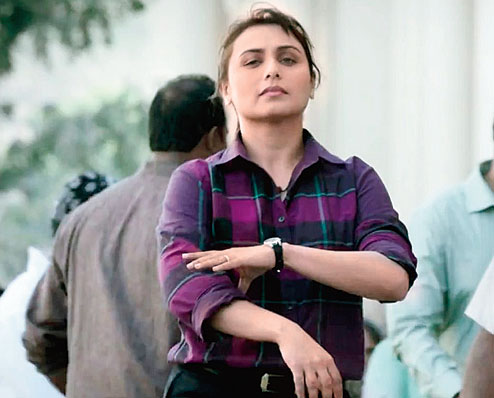 |
| Rani Mukerji as tough cop Shivani Shivaji Rao in Mardaani |
In Mardaani, Shivani Shivaji Rao, a cop, who befriends a young flower seller, ends up uncovering a whole sex-trafficking ring, when her young friend goes missing.
In Dabangg, Chulbul Pandey, a cop who calls himself Robin Hood, recovers the money that a gang of robbers is stealing from a bank by beating them up and then keeps the money himself.
Both movies are action-packed, have special effects, chases, kicking, boxing, funny dialogues and suspense. So why did a man at a Delhi party tell me that he did not like chick flicks, when I asked him if he had seen Mardaani?
What makes Mardaani a chick flick? Is it because Mardaani has more dialogue than monologues, more relationships than cameos, and relies for its suspense on a story line, rather than episodic fights and dances?
Or is it that the only song in Mardaani is of freed women marching out of captivity rather than a misogynistic and voyeuristic “item” number to the words Munni badnam hui. Or is the sad truth just that the main character in Mardaani is a female cop and the main character in Dabangg is a male cop.
Does this mean that men are uninterested in or uncomfortable with female characters in lead roles as movers and shakers? And since men have more purchasing power, will they continue to make a difference in the box office success of movies?
I’m not challenging the choice men make; I’m just questioning their discomfort. After all, if they think back to their school days, most authority figures in their lives were women-mothers and teachers. Does their discomfort stem from this? Do they feel infantilised when confronted with strong women? So do they feel a greater sense of power when they see men in action oriented macho roles and feel disempowered when they see women in a similar role?
It is indeed sad that while whoever has power takes over the noun — and the norm — while the less powerful require an adjective. Thus, we read that there are “movies” and then there are “chick flicks or chick lit”.
So think about it: What will it take for movies like Mardaani to succeed? Will it require for men to get more comfortable with strong women or women to gain more purchasing power?
Indeed, as long as men are taken seriously when they save the female half of the world — and women aren’t taken seriously when saving themselves, much less men — the stories and narratives will always be more about power than talent.
Bias punishes everyone. What if as the opposite of “chick flick” or ‘chick lit’ as an adjective — “prick flick or prick lit” would guide our choices? Would it help us eliminate movies and writings, with mind-numbing and senseless violence or with caricatured men masculinised because they are bossy or dominant?
The simple label “prick flick” could lead us easily and quickly to filter through the thicket of televised, downloaded and theatrical releases to such so called attractions as:
All the movies and TV serials that glorify men as breadwinners and hunter-gatherers. From movies with Jeetendra, Dhamendra and Shatrughan Sinha, actors who conveyed heroism by watching women straighten their tie and send them to office to movies with Salman Khan, Sunny Deol, Akshay Kumar, actors who convey masculinity by watching women do item numbers.
All the movies and TV serials that glorify sindoor-wearing women protected by a male head of the family. These feature sadistic humourless husbands as ordinary male adults who haplessly are supposed to make all decisions, plus cleverly plotted humiliations of powerful women for the well-educated misogynist.
All the movies that glorify wars against Pakistan, and the war on terrorism. Watching Sunny Deol go and get a bride against all odds from Pakistan or a Hrithik Roshan shot in the torso and fall into a swamp in Kashmir is not much fun to watch — but they justify our country’s purchase of more fighter planes and surveillance systems. Without frequent exposure to our enemies, how are we to believe that are defence budgets are justified?
All the movies that insist female human beings are the only animals on earth that seek out and even enjoy their own pain. From glamorised versions of stunted infantile brides submitting to dominating controlling families and husbands to such complex plots as the sublimation of Meena Kumari in Pakeezah.
As you can see, one simple label could guide you through diversity, and help other viewers to practice avoidance.
In our own self-interest as both women and men: why not look for labels to guide us to movies we do like, unbiased by sex or gender. It might open new frontiers and create more choices and if you really think about it, the man in the Delhi party might like to watch a chick flick after all.










